Dental Implants in Brookfield, CT
Single Tooth Dental Implants
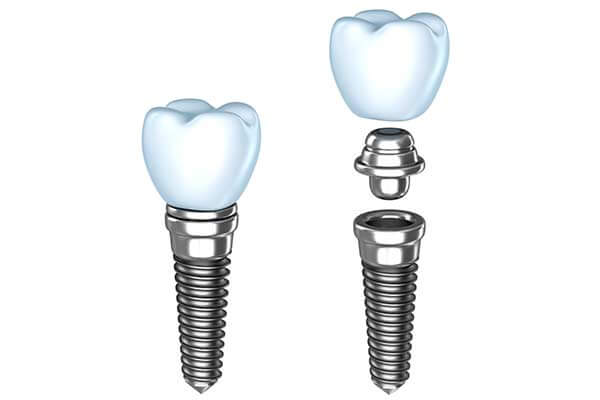
Dental implants replace tooth roots in the mouth. Implants provide a strong foundation for fixed or removable replacement teeth and can aid in the prevention of bone loss in the jaw.
Implant Supported Bridges
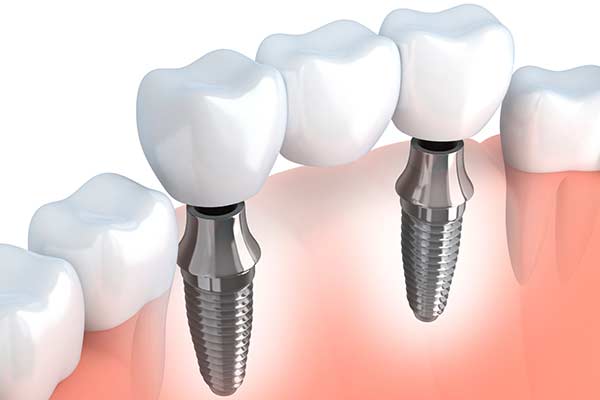
An implant supported bridge is a restorative solution for spaces where three or more adjacent teeth are missing. This restoration typically requires two implants to support the porcelain bridge. The bridge provides a functional and aesthetic replacement for a patient’s natural teeth.
Implant Supported Dentures
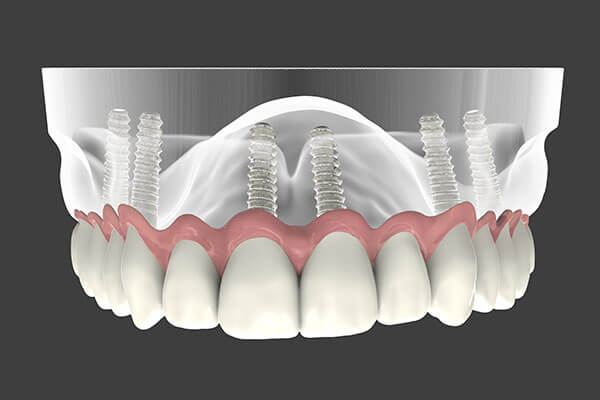
For patients who are missing many or all of their teeth, implant supported dentures may be an alternative to traditional dentures. This solution requires the placement of two or more implants. In order to replace a full arch denture, a minimum of four implants is generally recommended. Eligibility for this solution is dependent upon a number of factors, with jaw bone density being one of the most significant determining factors.
Traditional dentures rely on an acrylic base that sits directly on the gums, held in place by a paste or adhesive. Using implants as supports for dentures allows for a smaller and more comfortable base and less shifting of the prosthesis during use.
Implants can support both full and partial dentures as well as both fixed and removable dentures. If a removable denture is selected, the denture will “snap” on to the implant rather than requiring the use of denture paste or adhesives.
Full Arch with Only Four Implants
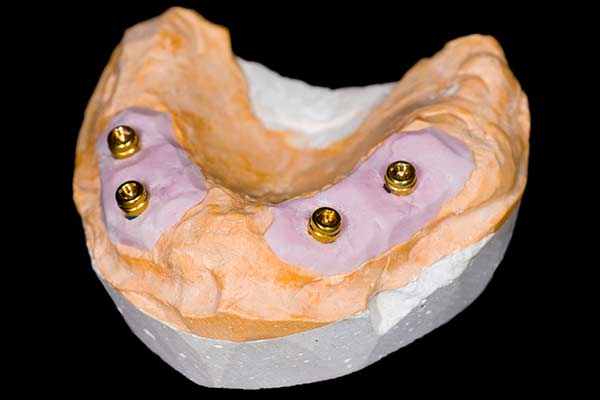
This procedure is a unique implant solution that allows patients with a completely edentulous (toothless) upper or lower arch to replace all of the teeth in that arch using only four implants as anchors.
Mini Dental Implants (MDIs)
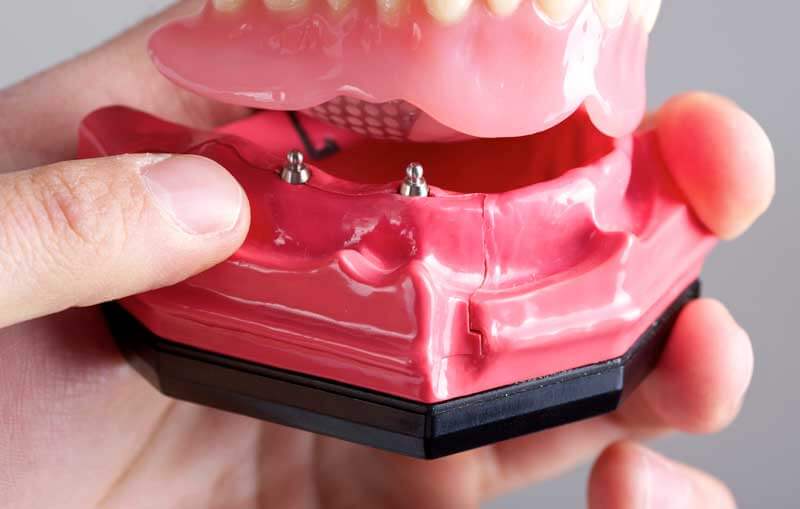
There are times when a full size implant is not a viable option, and in many cases an MDI may be a great solution. Small spaces or inadequate bone mass in the jaw may prevent the use of traditional implants. Mini Dental Implants are similar to regular implants but, as the name suggests, are significantly smaller in diameter. Dental implants typically take 2 visits and require a waiting period of a few months from the time of implant placement to the time the permanent replacement tooth can be placed. The placement of MDIs is minimally invasive, often requiring only local anesthetic and no sutures. For this reason, MDIs can often be placed with the final replacement tooth in one day.
The Benefits and Importance of Dental Implants
Want to know more about why you should choose dental implants?
Learn More About the Benefits of Dental ImplantsDental Implant FAQs
How long do dental implants last?
With good oral health and proper care and maintenance, dental implants can last a lifetime. The restorations attached to your implants may need eventual replacement, but the implants themselves are meant to be a permanent replacement for the roots of missing teeth.
How painful is a dental implant?
The area where we’re working is numbed with local anesthesia prior to your dental implant surgery, so you won’t experience any pain during the procedure. You are likely to experience some discomfort in the days after your surgery, but most patients find recovery from implant surgery easier and less painful than recovery from tooth extractions and other oral surgeries.
How long after dental implants can I eat normally?
You should wait for the anesthesia to wear off from your dental implant surgery; once it does, you can begin to eat soft foods with care. We will provide you with detailed aftercare instructions to help you understand what you can eat and when.
Can you chew gum after dental implants?
Once you have healed from your surgery, you can chew gum, enjoy sticky candies, and bite into corn-on-the-cob or apples. What sets dental implants apart from many other types of restorations is that they give you the stable support needed to eat your favorite foods.
Why are dental implants so expensive?
Unlike other types of restorations for missing teeth, dental implants replace the root of the tooth, which means a surgical procedure is required for their placement. Then there’s the cost of the implant itself and the restoration—the implants are made from high-quality biocompatible metal, while the restoration is carefully crafted by a skilled dental technician to look natural and blend in with any adjacent teeth. You’ll also need to pay for imaging, any supplemental procedures needed to prepare for the surgery, and multiple office visits. In other words, dental implants are expensive because there’s a lot involved in the process. They’re also more expensive because insurance is less likely to cover all of the costs, meaning patients need to pay more out-of-pocket.
Is it too late for dental implants?
As long as you are in good health, it’s never too late for dental implants. Sometimes if you’ve been without a tooth for a while, you won’t have sufficient jawbone support for a traditional dental implant. In these cases, you can have bone grafting to rebuild the jaw prior to implant surgery or you may be a candidate for mini dental implants, which are smaller and don’t require the same amount of bone density.
What is the average cost of mini dental implants?
Mini dental implants are less expensive than traditional dental implants. They usually cost between $500 and $1500 per implant, with an additional cost for the restoration that attaches to the implant.